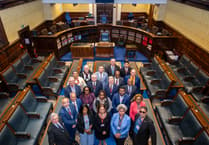Bishop Peter Eagles has raised concerns that allowing one party to decide a marriage is over could lead to greater inequality.
He was speaking as the Legislative Council gave the Divorce, Dissolution and Separation Bill 2020 its first reading.
The Bill, crafted by Daphne Caine (Garff), is being guided through LegCo by Jane Poole-Wilson.
It will, among other things, give couples or individuals the right to seek a no-fault divorce within six months.
However, Bishop Eagles said he is concerned if it became law it would ’give the green light’ to one party abandoning the other in a marriage without having to give a reason.
He said that while it was ’clearly a straightforward piece of legislation’, the Bill could have far-reaching implications and he encouraged members to consider the impact, among other things, on children when it returns for its second reading.
’I can see how it might act as a response to the hopes of many people who are otherwise hopeless in unhappy and loveless marriages’ said the Bishop.
resonance
’People marry and sadly, sometimes they grow apart and even if they’ve begun that married life in the context of faith, they may come to find, just a few years later, that there is nothing left that has any resonance with those first vows taken under God.’
He said that this is a very sad situation for people to find themselves in and noted the impact it has had on some people who responded to the public consultation on the Bill, one of whom referred to it as a ’living hell of verbal exchanges’.
And he said that in marriages where couples have drifted apart, where there is no blame of fault, divorce may be the way forward.
But he said he had concerns in cases where one party might not accept that the marriage.
The Bishop said: ’I can also imagine another kind of sadness just as acute. And that’s the sadness of someone who is abandoned without any recourse left to them at all.
’And that’s very likely to happen because three out of four divorce petitions are against the will of one spouse.
’It is simply not that case that most divorce proceedings are initiated by the couple, which is the context which this Bill assumes.
’If that were so, the Bill would be much less problematic. Instead, divorce proceedings are usually initiated by one person against the wish of the other.
’So my concern here is that the proposed legislation would accentuate that inequality rather than reduce it.’
He added he would not wish anyone to be told that the law would allow one person to abandon the other without being required to give a reason.
However, he did say that he could support the Bill so long as ’the compassion and humanity that it so obviously wants to bring is available not just for one partner in the marriage but for both’.
After the debate, Daphne Caine MHK said: ’The place to debate new legislation is in the branches of Tynwald so I welcome the Bishop’s views.
’The fact is that some marriages and civil partnerships break down and the current system forces one party to cite a fault based reason to enable the couple to divorce more quickly.
impact
’It results in an adversarial process and additional emotional and financial impact on the couple and any children.
’All the research I have seen and the experience of family lawyers I have discussed it with, is that this legislation will make applying for a divorce a more honest and less confrontational process when either or both parties have come to the conclusion the marriage is over.’

.jpeg?width=209&height=140&crop=209:145,smart&quality=75)
.jpeg?width=209&height=140&crop=209:145,smart&quality=75)

